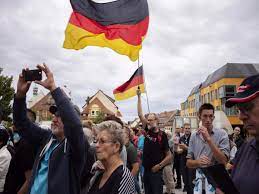
BERLIN, Sept 16, 2021 (BSS/AFP) - After 16 years in power, Angela Merkel
is set to retire as chancellor following a general election on September 26,
leaving a gaping hole in German politics.
In the run-up to a vote that will mark a seismic shift for Europe's
biggest economy, the race to replace Merkel is wide open -- as is the
question of what the next government will look like. The Social Democrats
(SPD) are currently leading in the polls, ahead of Merkel's CDU-CSU
conservative alliance in second place and the Greens in third.
- Why is Merkel leaving? -
Merkel, 67, announced that her current and fourth term in office would be
"the last" in October 2018, when her CDU had just suffered an electoral
setback in the state of Hesse.
The decision marks the first time since 1949 that an incumbent chancellor
has not run for re-election.
Appointed chancellor for the first time on November 22, 2005, Merkel has
been in office almost as long as Helmut Kohl, Germany's longest-serving
leader who was in power for just over 16 years (5,869 days).
She has already overtaken Konrad Adenauer, the chancellor credited with
reviving the economy after World War II and who ruled West Germany for 14
years.
- What do the Germans want? -
The economy and the future of German industry have been important issues
during the election campaign.
The country's flagship car industry is facing an existential crisis
precipitated by the decline of the combustion engine and its consequences for
the 800,000 workers employed in the sector.
Digitalisation has also been a theme, though Germany is "badly behind" on
this, according to Paul Maurice, a member of the Franco-German Studies
Committee at the French Institute of International Relations.
Climate change has also been an important topic, especially after deadly
floods hit western Germany in July, killing more than 180 people -- a
disaster that experts have linked to global warming.
Nevertheless, says Maurice, the campaign has been "very (person) centred,
with not enough talk of the parties' programmes" -- a phenomenon he suggests
could be down to the "Merkel effect".
- What does the election mean for Europe? -
As the most powerful country in Europe, Germany plays a key role in the
European Union.
From the financial crisis in the eurozone to the conflict in Ukraine and
the thorny issue of migration, Merkel has left deep footprints in European
politics.
The arrival of a new chancellor will be a big change for the bloc -- with
the sometimes rocky but crucial Franco-German relationship keenly in focus,
also because France goes to the polls in April 2022.
Once a new government is in place, Germany will be expected to bring some
fresh momentum to the European Union, says Maurice.
- What will happen after September 26? -
Merkel cannot just go home and put her feet up as soon as the election is
over, but will be expected to continue to run the country until her successor
is elected by Germany's lower house of parliament, the Bundestag.
Usually the party with the most votes will try to form a coalition with
one or two other parties, which must then draw up a roadmap together for the
future government in the form of a "coalition contract".
First there will be informal talks, followed by actual coalition
negotiations.
In 2005, the CDU-CSU and SPD took two months to form a so-called grand
coalition. But after the September 2017 elections, negotiations lasted until
February 2018.
The CDU-CSU first tried to reach an agreement with the Greens and the
liberal FDP, but the liberals withdrew from the talks, forcing the
conservatives to settle for another alliance with the SPD.